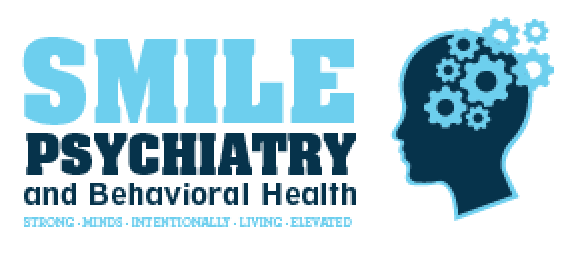Holistic Depression Treatment for a Happier Life
At Smile Psychiatry & Behavioral Health, we offer comprehensive treatment plans for depression that can include therapy and medication. We promise to stand beside you as we light a path toward a brighter future together.
Book an appointment today!
Depression Treatment for Adults in Utah


Depression is a mental health disorder that can make even the most beautiful moments feel empty, hollow, and lonely. And, most of the time, there isn’t a direct cause. If you have depression, maybe you’ve questioned your feelings of hopelessness, or wondered why you can’t just feel happy and passionate like you used to.
Maybe you have a decent life, a job you like, and a family. But still–there’s a pervading sense of darkness and gloom that hangs over you, weighs on your shoulders, and nothing seems to make it go away. The good news is that you don’t have to feel this way forever.
What is Depression?
Depression is a common and often debilitating mental health condition that affects a person’s ability to feel pleasure, interest, and motivation. Many people with depression describe a persistent feeling of sadness, one that doesn’t ever completely go away, regardless of their external circumstances. People who experience clinical depression often feel hopeless, guilty, exhausted, and worthless, and they may find it difficult to focus, make decisions, complete simple tasks, or enjoy the hobbies and activities they used to.
If you’re reading this page, chances are these symptoms resonate with you. Maybe a loved one encouraged you to look into therapy, months ago, and you’ve just now gathered the motivation to do the research. Maybe you’ve been to therapy in the past and wish the battle could just be over. Maybe you have questioned whether your feelings are valid–whether it’s really possible for you to feel so hopeless when your life isn’t all bad. Whatever your situation, your sadness is taking a toll on your life.
Thankfully, you’ve come to the right place. At Smile Psychiatry, we offer psychiatric and therapeutic services to give you the holistic support you need. Sometimes all it takes is an outside perspective or an extra hand to make the darkness more bearable and help you find a flicker of light.
What Are the Symptoms of Depression?
Depression is different for everyone. Some describe feeling as though they are constantly on the verge of tears, while others feel apathetic and cut off from the world. Generally, people with depressive disorders struggle with:
- Feelings of guilt, irritability, or frequent crying
- Low self-esteem
- Hopelessness
- Apathy
- Loss of interest
- Loss of appetite
- Disturbed sleep or excessive sleeping
- Low energy or fatigue
- Weight loss or gain
- Trouble concentrating or memory issues
- Thoughts of suicide or self-harm
- Physical pain without cause
How Do You Know If You Have Depression?
Everyone has felt sadness, hopelessness, and apathy at some point in their lives. Clinical depression is when these feelings persist, regardless of external circumstances, and interfere with your daily life. Maybe your performance is dropping at work, or maybe you simply don’t enjoy it the way you used to. Maybe you don’t feel passionate about the things and people you used to love, and you’re struggling to maintain relationships. Maybe you’ve felt this way for so long that you’re starting to wonder whether things will ever get better. You just want to feel happy again. If your sadness is affecting your life, your fulfillment, and your ability to be the person you want to be, you may benefit from seeking out a diagnosis and starting therapy.
The diagnostic process for depression begins with a consultation with your healthcare provider. Taking the first few steps toward a diagnosis and treatment can be difficult, especially if your depressive symptoms are affecting your hope for the future, so don’t hesitate to reach out to a loved one to help you schedule appointments and keep in touch with you about the process. After discussing your symptoms with your provider, they may suggest lifestyle changes to improve your symptoms. If your lifestyle is generally healthy and your symptoms have lasted more than a few weeks, your doctor will refer you to a psychologist for an evaluation. At your evaluation, you will discuss your symptoms and medical history and then return for a follow-up appointment to discuss your results and a plan of action. Remember that your voice is important in this setting. Let your psychologist know your preferences about antidepressant medications, therapy, and other treatments so that they can refer you to the professionals who can best help you.
What Are the Different Types of Depression?
Major Depressive Disorder
Major depressive disorder is characterized by a lack of interest in most activities and a consistently low mood. This type of depression differs from others in that its symptoms are more severe and constant, and thus interfere with a person’s ability to function properly. These symptoms range from apathy and numbness to a near-constant feeling of sadness and thoughts of suicide.
Bipolar Disorder
Also known as manic depression, bipolar disorder is a depressive disorder known for its extreme highs and lows. People with bipolar disorder experience depressive periods that may last a few weeks to several years, and their depressive symptoms usually resemble those of major depressive disorder.
Seasonal Affective Disorder
Seasonal affective disorder is when a person experiences a period of major depression for a season, usually during the fall or winter. This type of depression is unique in that it often responds well to light therapy because of its correlation to sunlight exposure.
Persistent Depressive Disorder
Persistent depressive disorder is a chronic form of depression. People diagnosed with persistent depressive disorder have experienced symptoms of depression for two years or more. These symptoms may include lack of energy, poor sleeping habits, a low self-image, and general feelings of hopelessness or disinterest.
Situational Depression
Situational depression is an informal term used to describe a period of depression that occurs as a result of stress. Situational depression may be triggered by big life changes such as a divorce, demands in the workplace, the death of a loved one, relocating, or losing a job. A person with situational depression experiences symptoms of major depression that typically lessen over time, especially when treated with therapy.
How Does Depression Treatment Help?


Although depression is characterized by its symptoms of hopelessness, there is a lot of hope for people with depressive disorders. Depression is a highly treatable mental health condition, and therapy is the number-one treatment recommendation. Because depression affects the way you think and behave, psychotherapy is a great opportunity to learn how to change the thought cycles that are feeding your depression. Although you may not experience instant relief, therapy will give you the tools to start thinking and acting in a way that is more passionate, hopeful, and meaningful.
Your therapist will provide you with the unique strategies you need to not only manage your pain, but also to create lasting change. Depression is often chronic, which means that you may experience it to some degree your whole life. Maybe with the way you’re feeling now, that sounds unbearable–but therapy will teach you how to find and create hopeful moments and experiences every day, how to be mindful of your emotions, and how to relax and find peace even amidst distress.
How Does Medication Help With Depression?
Emotions manifest themselves in the brain in the form of chemicals and neurotransmitters. If you are depressed, you may have an imbalance of chemicals in your brain that is contributing to your symptoms. Medication–antidepressants, in particular–can help your brain produce more of the chemicals that will improve and regulate your mood. If you have been experiencing symptoms of depression for several months, talk to your therapist and psychiatrist about potential medications you could try. At Smile Psychiatry, we offer therapy and psychiatric services, which means that you can get an antidepressant prescription from the professionals who know you and your medical history and who will stand alongside you throughout your journey.
Looking for Help With Depression?
Whether you’ve struggled with depression for a long time or just recently started experiencing the debilitating side effects of prolonged sadness, we want to help you feel better. We want to help you feel motivated, connect with your loved ones, and live at your fullest potential–something that’s difficult to do when everything feels dark. But more than all of that, we want to help you find hope. This may come by understanding your diagnosis a little better, finding support from a community of people who understand you, having compassion for yourself and your condition, setting small goals, and filling your life with little moments of joy.
There is a light at the end of the tunnel, but there’s also light along the way–and we can help you find that. Schedule an appointment with Smile Psychiatry today and start the journey to living a life you love.
See What Our Patients Have To Say...
Bruno was awesome! Good advice on proper treatment. He also connected with me over my faith (Church of Jesus Christ of Latter-day Saints), which is important to me when meeting with mental health professionals.
-Harrison
Bruno Silvia is amazing! He answered any question[s] and concern[s] I had.:)
-Aspen S.
Dr Barrett is so caring an professional, I was in bad shape going into see him and I found him to be compassionate and understanding. I would recommend him to anyone seeking help.
-Ben S
